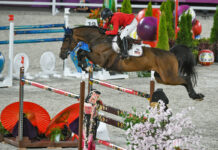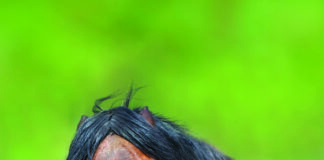With those sharp teeth, massive jaws, and mighty muscles, we can count our lucky stars that most horses have no interest in tearing into human flesh. It only takes one bite to cause serious damage and extreme pain. If you’re around horses long enough, there’s a good chance that one day you will have an encounter with those big chompers. Hopefully this will result in no more than a few choice words, a wish for quicker reflexes, and a strong desire to avoid a repeat of the experience. The best way to make that happen is to have a clear understanding of why a horse would want to bite a person in the first place.
What motivates a horse to bite the people can be related to these normal everyday behaviors: curiosity, food-aggression, mutual grooming (some horses try to return the favor when they enjoy being curried), and amusement, but these are not the only factors.

- Pain: Horses that hurt lash out with their teeth to express discomfort caused by injury, illness, or mistreatment. An injured horse should be handled carefully because he may bite at the people who are trying to help, especially if that help initially causes more pain. For a horse with no history of biting, a sudden and unexpected change in behavior may be a sign he’s in physical distress and needs a thorough examination. Pain caused by harsh or careless handling can incite a horse’s defenses and prompt him to bite. These horses are often wrongly labeled as “aggressive.” If training or handling techniques are triggering a horse’s defense mechanism, they should no longer be used.
- Fear: A fearful horse finds himself feeling insecure or vulnerable. Fear can be triggered by pain, people, a stressful situation, other horses, or the memory physical or emotional trauma.
- Confusion: Being asked to do something that doesn’t make sense, especially repetitively and over an extended period of time, can cause a buildup of frustration that eventually compels a horse to act out.
- Solitude: A horse that lives alone doesn’t have mates to nip and bite at all day. When his human comes to the door, he’s hungry for social interaction.
- Territory: Some horses are very protective of their home, especially if they live in a small space. Food can heighten the intensity with which a horse goes after those who come too close.
- Gender and Age: Young playful horses are curious and testing boundaries. Stallions use their teeth to protect their herd.
- Learned Behavior: Rewarding a horse with a treat when he rummages around in your pockets or nips is an excellent way to teach your horse to use his teeth with impunity. Running away when your horse bites, or “biting” back (smacking or attacking a biting horse can be misinterpreted as play or increase agitation and the motivation to retaliate) reinforces the behavior.
Dale Rudin is a CHA-certified riding instructor and clinician with a mindful and balanced approach to horsemanship and riding. www.un-naturalhorsemanship.com.






